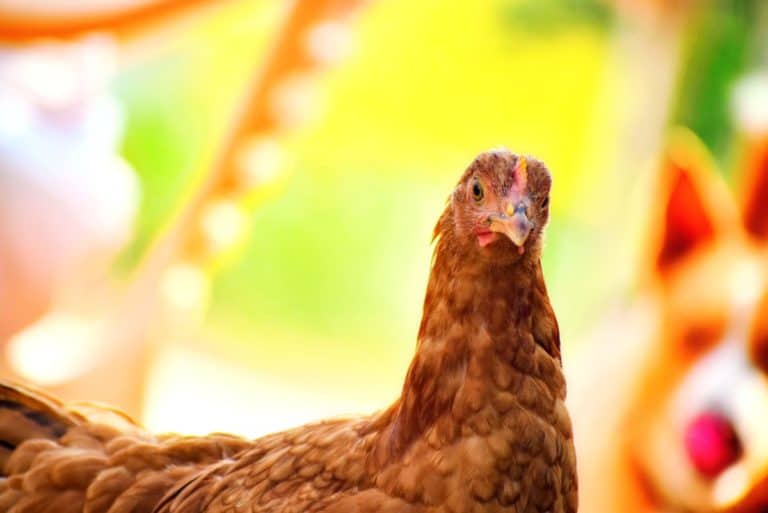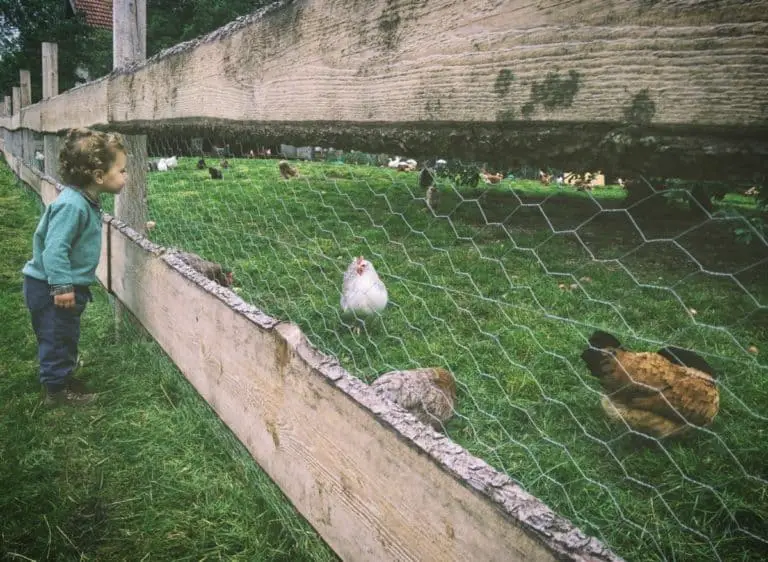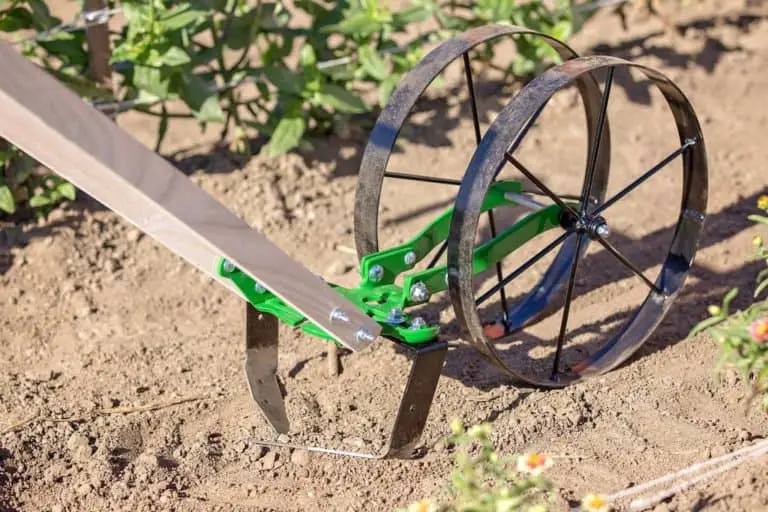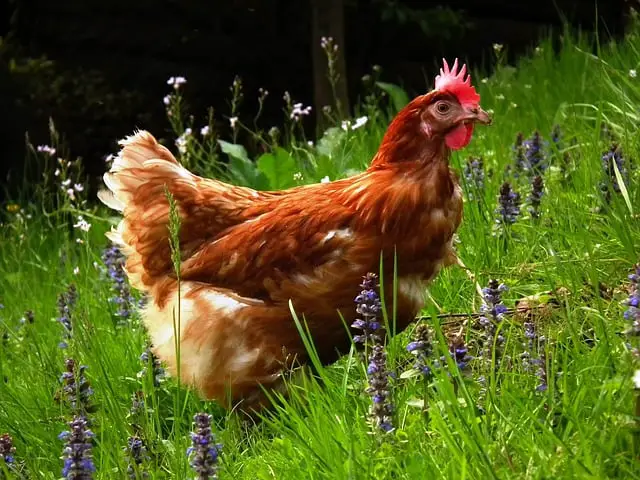
Raising Free-Range chickens makes perfect sense for most farms, and increasingly, even for homeowners. Many cities have lifted the ban on backyard chickens making it a perfect setting for Free-Range chickens.
A happy chicken brings great reward to its owner, and allowing them to “Free-Range” can truly make them happy. But there are both advantages and disadvantages to the practice of free-ranging chickens that we need to examine.
Let’s look at why you should consider raising your chickens “Free-Range”, and why this method might not be right for you.
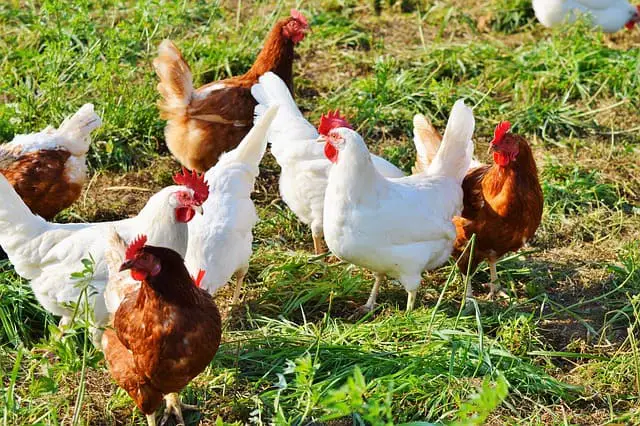
Happy Chickens
Chickens were designed to scavenge for food, and watching them scramble for bugs and scratch for worms brings a wonderful sense of satisfaction. They are doing what they love to do, and they are happy doing it, but are there advantages?
Having your chickens forage for food, is beneficial to you, the farmer/homeowner, and also to the chicken. Usually, free-range chickens will be much healthier, and that means more egg production for you.
The USDA definition of free-range is that the animal “must be allowed access” to an outdoor space. Note that it says “allowed access”. Many large producers use these words as a loophole so they can label their chicken as “free-range”. They will have a door that opens to the outside, but the chickens seldom if ever actually go outside. They really don’t know what “outside” is.
That’s not the concept we are talking about here. We’re talking about chickens that are not confined to a coop but have regular access to the Great Outdoors. And there are many benefits to that. Let’s discuss the benefits first.
Egg Quality of Free-Range Chickens
A study made by Mother Earth Magazine comparing “Free-Range Eggs” to the USDA data for “Commercial Eggs” found that Free-Range Eggs had:
- 1/3 Less Cholesterol
- 1/4 Of the Saturated Fat
- 2/3 More Vitamin A
- 2X More Omega 3 Fatty Acids
- 3X More Vitamin E
- 7X More Beta Carotene
I’ve been used to eating fresh Free-Range eggs for a long time, so I guess I’m somewhat spoiled. Recently I went to a restaurant for breakfast with some of our friends one morning and upon receiving my fried egg, I was shocked at how pale the yolk was. It was a pale, pastel yellow, and it was rather tasteless.
There’s nothing like a “fresh” egg. If the chickens are out eating bugs and worms all day, the egg yolk should be a dark orange (not pale yellow). That’s how I know they are really taking a bite out of the bug population. The egg yolk will be dark and will have a rich taste that you won’t find coming from a store.
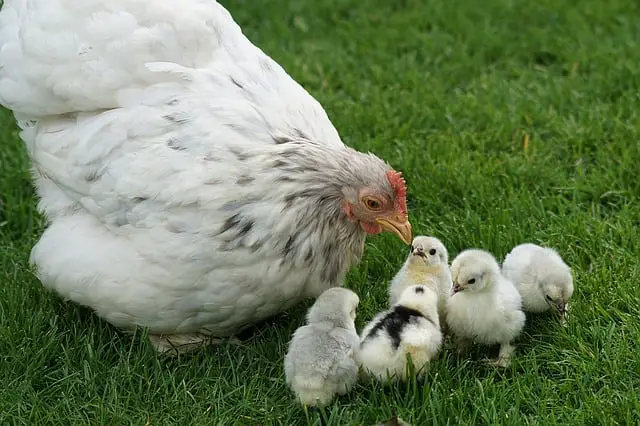
I’m sure fresh eggs also add flavor and richness to baked goods. That is probably why top chefs demand fresh eggs for their culinary delights. If I ever have to stop raising chickens, that’s what I’m going to miss, those wonderful, flavorful, and healthy… Free-Ranged Fresh Eggs!
Free-Range Lawn Care
Have you ever wished someone would just do your yard work for you? Some of you may hire that out to a lawn service, but chickens will actually eat grass and fertilize at the same time. A chicken is a raptor-like Lawn Care Service. There is input (they eat the grass) and there is output (they “distribute” the fertilizer).
I’m not saying you won’t need to mow again. They are not that efficient at cutting grass. but they will eat quite a bit of it, and it is very good for them.
Understand that their fertilizer is very, very potent. It is high in nitrogen which the grass requires to grow, and it is very beneficial to the land. Many people ship in chicken fertilizer for their gardens. It’s that good.
But along with the good benefits of the manure comes a downside too. If they are left too long confined in a small yard, their manure could burn that lawn because it is so hot (nitrogen-rich). I think it would take a lot of chickens, confined to a small yard, for a long time, for this to happen, but it certainly could.
Insect Control
Chickens love bugs. They would much rather eat a bug than they would eat feed out of a sack. And since we as homeowners fight bugs constantly, how nice is it that an animal helps us out in this regard? Spiders, crickets, grubs, grasshoppers… all are fair game for a spry chicken.
How many bugs they actually eat will be determined by how fast they are, and how slow the bugs are. But it is fun to see them scurrying around when they spot one, and then to watch them fight over it if one of their girlfriends grabs it first.
Just know that one of the greatest benefits of letting your chickens roam around Free-Range is bug control. Especially in the summer when the grasshoppers begin to move in.
In The Garden
One of the best things you can do is allow chickens into your garden. And, one of the worst things you can do is allowing chickens into your garden. Perhaps I need to explain.
Lots of folks will use chickens to keep the gardens lightly tilled. Many people will put chickens on a future garden spot, allowing them to keep the ground scratched up and aerated, as well as eat the unwanted grass and weeds, and especially any weed seeds that might be there.
If you are a gardener you know that if there’s a weed seed anywhere near it’s going to find its way into your garden. A group of chickens can go a long way in removing grass and weed seeds that might plague you later on in your garden.
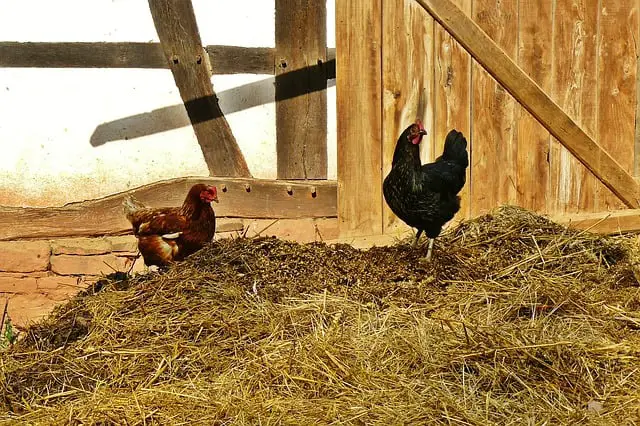
How could that be bad? Well, if you’ve planted your garden, the chickens could come behind you and scratch up the seeds you’ve sown. And, if the garden is currently producing, they will peck and eat any tomato they can reach, along with squash, cucumbers and other garden produce too.
For that reason, I usually don’t allow my chickens in the garden once I start planting in it. At the end of the season, I might let them in to clean up some of the dead plant material and whatever bugs are still hanging around.
Free-Range Cost Savings
During the summer, when chickens have plenty of natural bounties to eat, you will find a definite decrease in your feed bill. In the winter, if you have snow on the ground, the chickens won’t go out and scratch and look for anything. But if it’s summertime, and bugs are aplenty, you will find a lot of what they consume is foraged and will see a definite decrease in their feed bill. That is great for your pocketbook.
Not only is that better for your bottom line, but it’s also better for the chicken. Those bugs and worms have a lot of protein in them, and they need that protein to lay the beautiful golden protein-rich eggs you want, and lots of them!
Breaking The Pecking Order
The popular phrase “pecking order” I’m sure comes from the humble chicken. They will establish a hierarchy pretty quick, and although I have seen a few “queens” dethroned, the pecking order usually lasts permanently.
When chickens are allowed to free-range, the pecking order almost completely goes away. They are so happy to be outside and have room to roam, that they really don’t peck each other much. Plus, the weaker members of the flock have plenty of room to run if Big Momma comes looking for them.
If your chickens are confined to a small coop or small chicken run, the pecking order becomes pretty intense. Those at the “top” of the order will be ruthless to those that they consider their “underlings”, and will relentlessly chase them and show their dominance. This will produce chickens that are stressed and can affect their egg production.
Many times, when a particular chicken has battle scars, the other chickens will peck at the wounds, and could even start to cannibalize.
Free-Range Chicken Meat
We’ve talked about eggs, but that’s not where the advantage of free-range chickens ends. If you butcher your own meat, free-range chickens are a healthier alternative to commercially grown chickens. Free-range chickens seldom if ever need antibiotics. They are just a healthier animal than one that is kept in confinement with thousands of others. A healthy animal should mean healthier meat for you.
I realize that most of you don’t butcher your own meat, but you certainly could. It’s not hard.
Fit Chickens
Chickens that run around all day looking for treats are also in better shape physically. They are just more fit than a chicken that lays around all day waiting for an egg to drop.
We said in the beginning that a happy chicken is an egg-producing marvel. Well, the same can be said of a healthy chicken. They will produce more eggs, and that is what we all want.
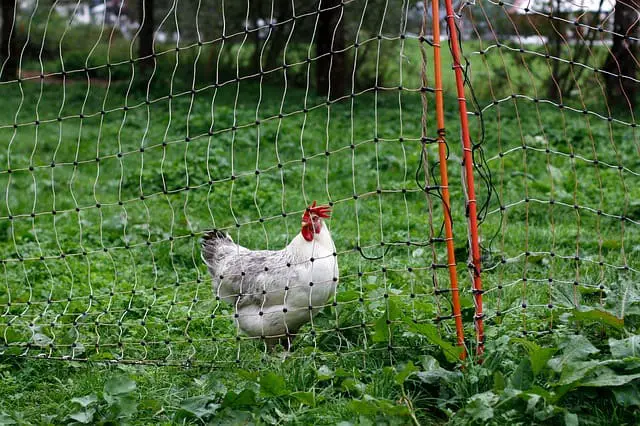
The Negatives Of Free-Ranging Chickens
I also said in the beginning that there were negative aspects to allowing your chickens to free-range. Let’s discuss them now.
Predators
The list of predators that would love a chicken dinner is long. Just about every carnivore and omnivore will have their eyes on your little girls.
But predators can be thwarted. I have an article that goes into great detail about stopping predation on your property. You can find that articlehere.
Neighbors
If you live on acreage you may not have a problem with neighbors, but if you have backyard chickens in a residential neighborhood, you probably will. Chickens don’t recognize the arbitrary boundary or property line that the Title Company laid out for your home. Unless fenced, they will cross it with impunity and wind up getting in trouble. Or more correctly, they will get you in trouble.
Chickens can be very messy. Remember when I said they were great at “fertilizing”? Well, sometimes their “placement” of that fertilizer can be a nuisance. Imagine your neighbor steps out one morning barefooted for his morning paper and there’s a “present” on his doorstep. He won’t be feeling much like Mr. Rogers that day.
You get the idea. You’re going to have to make sure they can’t escape the boundaries of your property. And that means you’ve got to have a fence.
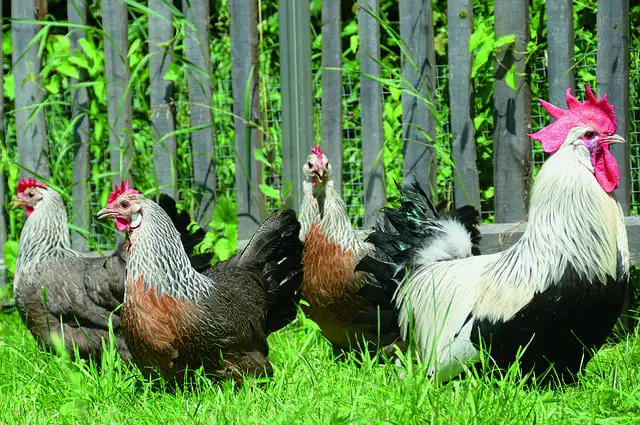
In another article on Predators, I listed “dogs” as one of the main culprits in the predation of chickens. For that reason, you are going to want to have a fence anyway. Stray dogs can and will kill all your chickens in a very short time. Sometimes even your own dog will if not “chicken broke”. That’s a phrase I just made up, but you know what I mean. A fence is your friend.
Egg Placement
Unless your chickens have been trained to lay in a certain place, they might just scatter eggs all over your property. That’s a lot of fun at Easter, but not near as much fun when you’re looking for your breakfast.
Free-Ranging can discourage the chicken from going back to the nest box to make her deposit. Maybe not. But it certainly happens. It depends on how far they stray from home. I think they are just so happy to be out eating bugs and such that when an egg starts to drop they just say, “I’m not going way over there to do my business”. They just lay it wherever they happen to be at the time.
You could lose some egg production, so make sure they are well trained as to where they are to lay their eggs before you allow them to free-range.
Free-Rang Roosting Problems
Chickens usually establish (with your help) a permanent place to bed down at night, or “roost”. If they wander too far from the roost, sometimes they will just climb up in a tree. It’s not very common though. Most of the time they will start heading for home in the very late afternoon.
Most people have an image of the wide-open spaces when they hear the words “free-range” but as you’ve seen here, a backyard is a great place for a chicken to be home on the “range”.
The Chicken Tractor
Sometimes free-ranging is not the right alternative. You may have an abnormal amount of predation or a “neighbor situation” that would preclude you from letting them roam, or you may not have a fence up yet.
In that case, you might want to consider the Chicken Tractor which would keep them much safer than if they are completely unconfined. It could be the “best of both worlds” for you. They come in lots of different designs and sizes and can be built from a plethora of materials.
Chicken tractors are meant to secure the chicken in a safe environment while giving them access to the grass and all the other goodies they would find in a free-range situation.
The Chicken Tractor has to be moved on a regular basis (usually daily), so there is more labor involved in implementing this practice in the place of free-ranging, but it is certainly an option. Here are several different Chicken Tractors at Amazon (my affiliate link) that can be purchased already built, and there are many how-to books showing how to build your own.
Also, I’ve got a Greenhouse design that can easily be converted to a Chicken Coop. In fact, I made a chicken coop using this design and so have dozens of other folks. You can take a closer look by following this link to my Greenhouse Page. Even if you don’t need a greenhouse, this could be just what you need to make a chicken coop or garden shed. Check it out.
What Is Best For You?
Obviously, this is a question you will have to answer yourself, but hopefully, I’ve given you enough information to make an informed choice.
Most people have an image of the wide-open spaces when they hear the words “free-range” but as you’ve seen here, even a backyard can be a great place for a chicken to be “home on the range”.
I have an extensive YouTube Playlist touching every aspect of raising backyard Chickens on my Channel. You can find out much more about raising Free-Range Chickens HERE
And, I have around 800 videos dealing with all other aspects of Homesteading, Gardening, Livestock, and Emergency Preparedness. You can find my Channel HERE

